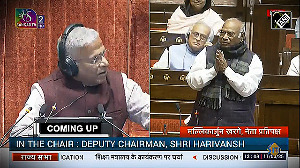Banks look set to increase lending rates with the Reserve Bank of India today unveiling a two-pronged "painful" correction process to tame inflation.
In a late Tuesday evening development, RBI raised the repo rate, or the rate at which it lends to banks, by 50 basis points to 8.50 per cent. The cash reserve ratio, or the proportion of deposits kept with the central bank, will be increased by 50 basis points to 8.75 per cent.
While the repo rate has been increased to 8.50 per cent with immediate effect, the CRR hike will be implemented in two phases: To 8.50 per cent from the fortnight starting July 5, and to 8.75 per cent from July 19.
Companies said that a high interest rate regime, which is now a certainty, will increase costs, slow demand and hit profitability.
The move will affect the corporate sector the most as banks are planning to mount the first round of assault on the loans that are extended below the prime lending rate.
While terming the RBI move as expected, K V Kamath, MD & CEO of ICICI Bank, said the exact impact on growth can be assessed only after the second quarter results.
The stock markets are expected to feel the heat tomorrow, with leading market players saying the sentiment will take a hard knock.
In the bond market, the yield on 10-year paper is likely to shoot above 9 per cent in morning trade, compared to today's close of 8.56 per cent. Call rates are also expected to breach the corridor and move above 8 per cent. In initial trade, the rupee may gain to hit around 42.75 against the dollar and move closer to 43, forex dealers said.
The increase in CRR will suck out around Rs 19,000 crore from the system and tighten liquidity, while the repo rate hike will make borrowings by banks more expensive.
The RBI move came four days after the inflation rate based on the wholesale price index touched 11.05 per cent at the end of the first week of June. RBI Governor Y V Reddy met the prime minister as well as the finance minister over the weekend.
"Be ready for tough times and a protracted difficult period," said a senior State Bank of India executive. He said that the deposit rates will rise by 25-50 basis points while the lending rates could see an increase of 50-75 basis points.
"The sub-PLR loans will see a substantial increase when they come up for revision," the executive added, without divulging details.
HDFC Vice-Chairman and Managing Director Keki Mistry said that India's largest mortgage player will wait till Monday before taking a call on interest rates. "I do not think that a half-a-percentage point rise will increase the cost significantly for the borrowers since the effective rate of borrowing is 5.1 per cent," he added.
While banks had absorbed the 75 basis point increase in CRR this year and the 25 basis point rise in repo rate, the fresh moves are going to force them to review rates again since their net interest margins will be squeezed further.
"Banks, while reviewing the rates will keep in mind the unabsorbed portion of earlier measures," Union Bank Chairman & Managing Director M V Nair said, adding that interest rates are likely to increase by around 50 basis points.
A senior finance ministry official said that the government was earlier keen that public sector banks focus on raising the interest rate on sub-PLR loans instead of effecting an across the board increase.
"Now, there is little scope for holding on to rates," the source added. The finance ministry is expected to issue a statement early on Wednesday.
IDBI Chairman & Managing Director Yogesh Agarwal said that banks will raise deposit as well as lending rates, but he does not anticipate a drastic impact on the growth in demand for loans. "In fact, companies will draw the sanction limits keeping in mind the trend of a rising cost of funds," he added.
It pointed out that aggregate deposits rose 23.2 per cent year-on-year on June 6 against the indicative projection of 17 per cent for 2008-09. Similarly, non-food credit grew 26.2 per cent during the period, which was higher than RBI's projection of 20 per cent.
It also said that investment demand remains strong, rising 14-19 per cent annually since 2002-03. This is also reflected in the pick-up in the growth of capital goods in April, while consumer demand too was rising as is evident from the turnaround in the production of consumer durables.
Positives
- Reasonable supply-demand balance
- Local players secure from global financial turmoil
- India decoupled from intensifying global food crisis
- Strong and resilient external sector
Pressure points
- Inflation at 13-year high of 11.05%
- Strong investment demand
- Widening trade deficit
- Fiscal pressure due to high subsidy bill, farm loan waiver







 © 2025
© 2025